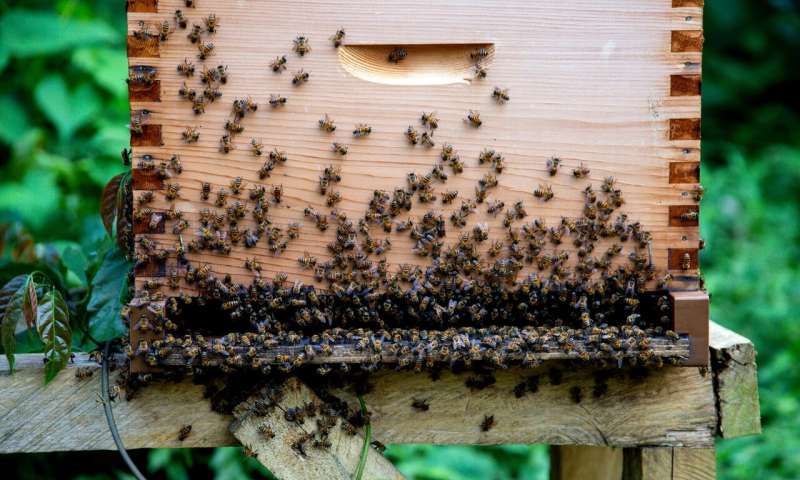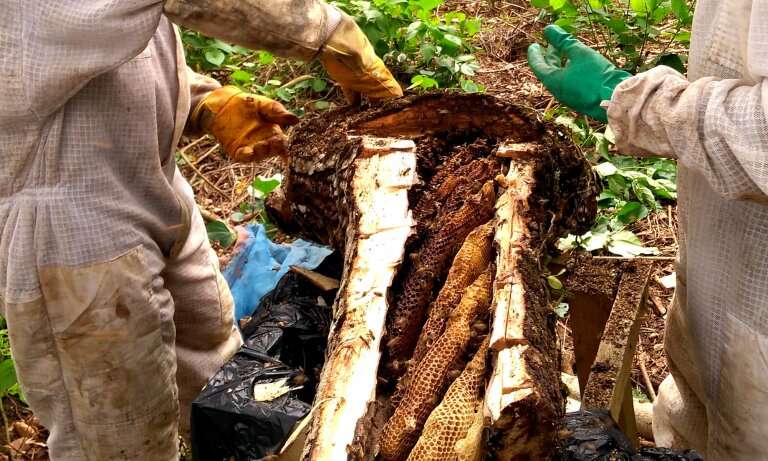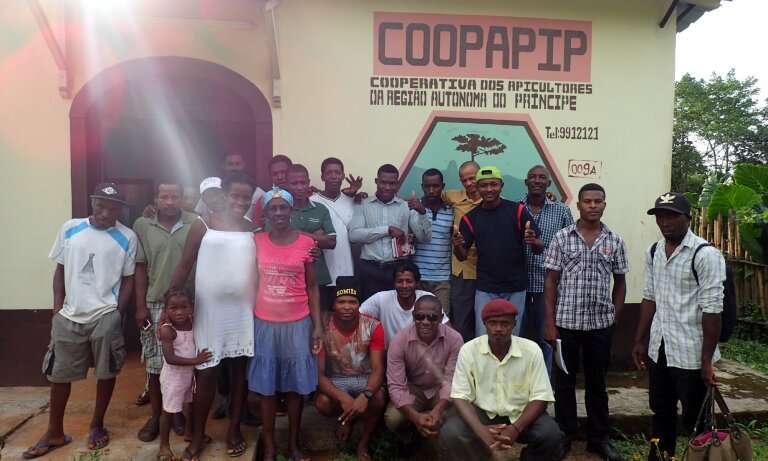Sustainable honey for food and forests: A beekeeper's story

Sticky and delicious, honey is loved by many across cultures and continents. This wondrous golden substance has been favored for millennia and is still a staple sweetener, found in many of our kitchens. Not just nutritious, honey is also famed as a treatment for numerous ailments and illnesses.
For at least 10,000 years, humans have extracted honey from waxy combs made by wild honey bees. Across the world, honey is still collected from wild nests and, until 2017, the tradition of wild honey collection was practiced in communities on the island of Príncipe, in the Gulf of Guinea. But this destructive process involved burning the nest, thereby killing most of the bees and threatening wild populations.
Alongside local partner, Fundação Príncipe, and national government, Fauna & Flora International (FFI) has been working with local people to develop sustainable honey production on the island. The Cooperative of Beekeepers of Príncipe, or COOPAPIP, was established in 2016 and aims to bring together Príncipe's beekeepers to promote beekeeping as an alternative livelihood and to ensure the preservation of bees.
We caught up with João Delgado Moraes, the president of COOPAPIP, to find out more about what goes into making each jar of sustainable honey and what beekeeping means not just for him, but the whole island.
Why did you start beekeeping?
I started by going to the forest to burn bees to collect honey with my younger brother when we were still young. At school, we learned that bees were important to the environment, but we didn't think that the way we harvested honey was so harmful to them. Producing honey like this was the only way we knew how.
In 2016, I heard about the creation of COOPAPIP and I was interested in participating because I wanted to learn more about these animals. In addition to learning from other, more experienced beekeepers, I learned that bees are essential for pollination and for producing our food. From then on, I didn't want to burn the bees anymore, but to protect them.

What do you enjoy most about beekeeping?
Everything. I love this work. I especially like the challenge of capturing the bees, creating new hives and feeding them. I am happy when we are able to rescue, protect and maintain a new hive.
What does a typical day of beekeeping look like?
A beekeeper's work is very dynamic and changes every day, depending on the needs of the bees. I answer calls from the community or COOPAPIP members to rescue swarms of endangered bees, sometimes from the roofs of houses or in people's fields. This work usually starts very early, around 5 am, and only ends once we have put all the bees in the new hive. This can take a few days as we transfer the combs to the hive, leave it in place and wait for the bees to enter the box before taking them to the apiary. When we do that, sometimes there is a little honey left, which we squeeze to sell.
When it is time to harvest the honey, we assist the apiary owner, take the product to our processing center and look after the entire extraction and packaging process. All of this work is done by our group of beekeepers, who combine their formal work with that of beekeeping. I usually spend at least two or three days a week doing this.
What are the challenges involved in beekeeping in Príncipe?
The biggest challenge was to learn the techniques, moving from burning bees to rational breeding, which was unknown to us. Even though it is the same species that occurs in other parts of the world, the bees have their own behavior in Príncipe, preferring to make nests in very tall trees (sometimes 30m high) and they need ventilation because of the humidity and high temperatures. Therefore, we had to adapt the hives and other equipment to our reality.

How does beekeeping contribute to bee and forest conservation in Príncipe?
Our contribution is to protect bees, which pollinate plants and support fruit production. This is an activity that can be done with low impact within a forest area, helping to preserve it.
How has COOPAPIP supported you to make a living from beekeeping?
Without COOPAPIP, I would not have the means or knowledge to be a beekeeper. Also, without the awareness and educational campaigns promoted by the project and COOPAPIP, I would not have the support of the communities to protect the bees.
What are your future beekeeping plans?
I want to be a great beekeeper; to learn more with my colleagues and teachers; to be a businessman, only living off the honey business, and to generate employment on the island. And I want to make it through the success of COOPAPIP. I also want help to share my passion for protecting the bees with all the people on the island. As a beekeeper and COOPAPIP president, I would also like to give thanks for the support that we received, not only materials but also knowledge.
During the first phase of this project, completed in January 2020, a new regional bee protection law was approved and over 30 people have become newly trained beekeepers. Almost 400 wild beehives have been saved from burning and COOPAPIP members have sustainably harvested nearly one tonne of honey, the profits from which go towards further promoting forest-friendly beekeeping techniques and supporting livelihoods. Since then, COOPAPIP is still going strong and almost 160 kg of sustainable honey has been harvested, almost 70kg of it from the group's own beehives.
Provided by Fauna & Flora International




















